18 Dec 2014 | Magazine, News, Volume 43.04 Winter 2014
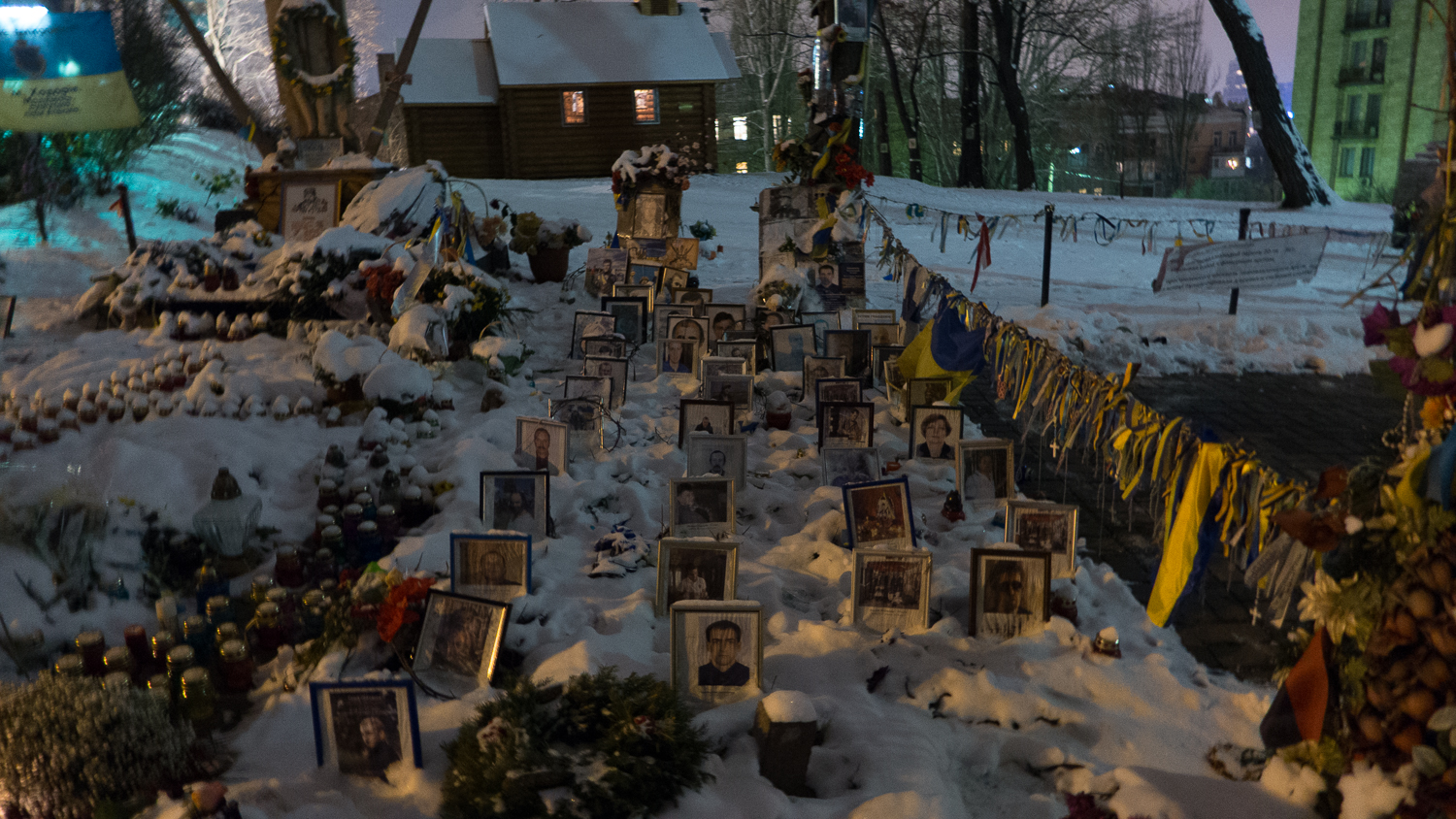
A makeshift shrine remembers the Ukrainians killed during protests on Maidan Nezalezhnosti. (Photo: Sean Gallagher / Index on Censorship)
“There is no civil war in Ukraine. It is a war between Russia and Ukraine, and it is inspired by heavy Russian propaganda,” says Volodymyr Parasyuk as we sit in a café on the main square of the regional capital Lviv in western Ukraine.
This year Parasyuk became a national hero in his country. Some say he changed history when he made a passionate speech on Maidan Nezalezhnosti in Kiev on 21 February 2014, after the police killed about 100 protesters. Parasyuk, head of a sotnia, a unit of 100 men, and part of the protesters’ defence force, demanded President Yanukovich resign and said otherwise protesters would launch an armed attack. The next day the head of state fled the country, and there was a new government formed in Ukraine.
Parasyuk knows what he is saying about war. He joined a voluntary battalion of Ukrainian forces and fought separatists in the east of his country during the summer and autumn. He was wounded and spent a couple of days in detention, but managed to escape.
“This is direct aggression by the Kremlin against my country. This war is completely directed from Russia. We do not have internal reasons to fight each other, the conflict is provoked by lies and propaganda that come from the east,” says Parasyuk.
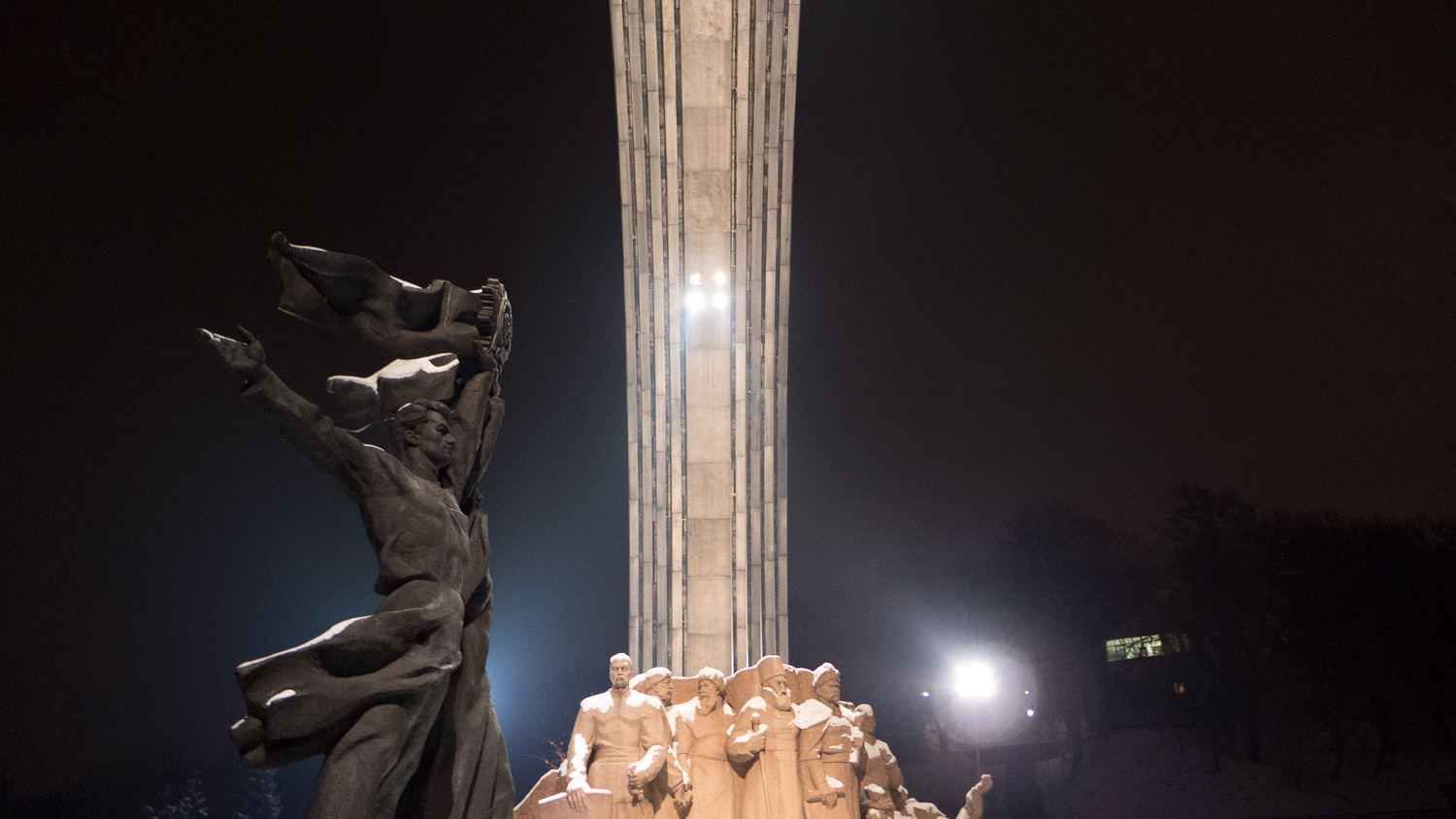
Statues near Maidan Nezalezhnosti celebrate the friendship between Russia and the Ukraine. (Photo: Sean Gallagher / Index on Censorship)
To read the full article, subscribe to Index on Censorship magazine or download the app, get 25% off print orders until 31 Dec 2014.
This excerpt was posted on 18 December 2014 at indexoncensorship.org
15 Dec 2014 | About Index, Draw the Line, Young Writers / Artists Programme
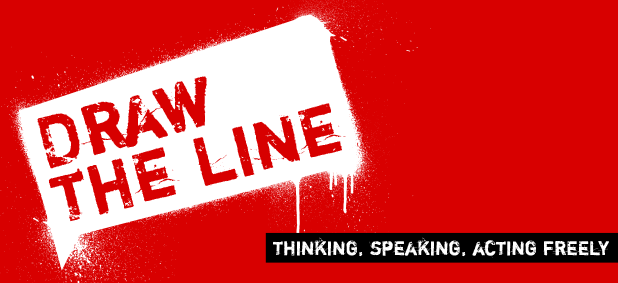
Religious freedom and religious radicalism which leads to extremism has become an increasingly difficult balancing act in the digital age where presenting religious superiority through fear and “terror” is possible both locally and internationally at internet speeds.
The ongoing series of beheading videos released by the Islamic State and the showcase of kidnapped school girls by Nigeria’s Boko Haram on YouTube are both examples that test the extent to which the UN Convention of Human Rights can protect religious freedoms. According to a report by the International Humanist and Ethical Union, Egypt’s Youth Ministry are targeting young atheists vocal on social media about the dangers of religion. In Saudi Arabia, Raef Badawi was sentenced to seven years in prison in 2013 and received 600 lashes for discussing other versions of Islam, besides Wahhabism, online.
Article 18 of the Convention states that the “right includes freedom to change his religion or belief, and freedom, either alone or in community with others and in public or private to manifest his religion or belief in teaching, practice, worship and observance”. The interpretation of “practice” is a grey area – especially when the idea of violence as a form of punishment can be understood differently across various cultures. Is it right to criticise societies operating under Sharia law that include amputation as punishment, ‘hadd’ offences that include theft, and stoning for committing adultery?
Religious extremism should not only be questioned under the categories of violence or social unrest. Earlier this month, religious preservation in India has led to the banning of a Bollywood film scene deemed ‘un-Islamic’ in values. The actress in question was from Pakistan, and sentenced to 26 years in prison for acting out a marriage scene depicting the Prophet Muhammad’s daughter. In Russia, the state has banned the publication of Jehovah’s Witness material as the views are considered extremist.
In an environment where religious freedom is tested under different laws and cultures, where do you draw the line on international grounds to foster positive forms of belief?
This article was posted on 15 December 2014 at indexoncensorship.org
17 Nov 2014 | Awards, News, Russia
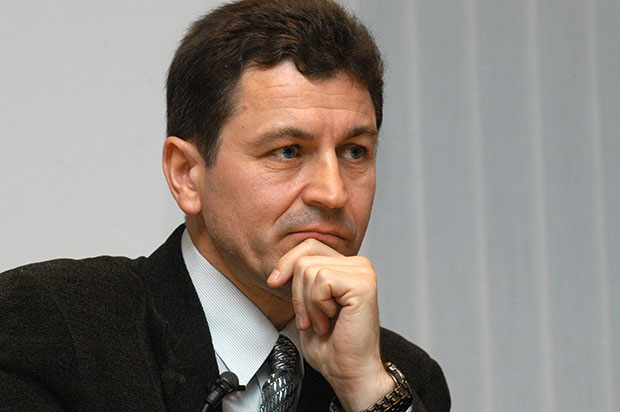
Former naval officer and journalist Grigory Pasko risked everything to uncover environmental degradation committed by the Russian Navy. (Photo: robertamsterdam.com)
In the 1990s, Grigory Pasko, a former naval officer and journalist, reported that Russia’s navy was dumping nuclear waste in the Sea of Japan (East Sea). After a series of articles exposing the environmental crimes, Russian federal security service agents arrested him in 1997, on charges of espionage and abuse of his official power. He was tried several times and eventually sentenced in December 2001 to four years of imprisonment for espionage. He was finally released in January 2003.
Pasko is one of many journalists who has been targeted by the Russian government. He says that freedom of speech and media in the country today, is not that different from when he was named International Whistleblower of the Year at the Index on Censorship Freedom of Expression Awards 13 years ago.
“It is just the same blatant rule by the security services, the same totalitarianism and lack of democratic institutions,” Pasko told Index in an email exchange.
Investigative journalists, in particular, are scarce in the current Russian environment, though the 1990 Law on the Mass Media [1991] states that journalists are allowed to carry on investigations. Article 29 of the Russian Constitution bans censorship altogether. However, under Vladimir Putin’s administration, Pasko said that press freedom and new, economically independent media have disappeared in favor of blatant propaganda.
Nominations for the 2015 Index on Censorship Freedom of Expression Awards close on 20 Nov.
Who will you nominate? A journalist? A digital activist? A campaigning organisation? An artist? Or all four?
“Investigative journalism barely exists as a genre in Russia,” Pasko said. “Journalists in our country are killed and put in prison.”
In March 2011, Pasko and his colleagues, Galina Sidorova and Igor Korolkov, established the Foundation for Investigative Journalism as a way to help professional and citizen journalists alike, as well as to create open discussion and respect for the law. It maintains “zero tolerance towards corruption in all forms”.
“Our goal is to help those who pursue this form of journalism,” Pasko said. “So far we have held schools in investigative journalism for journalists and bloggers in many towns throughout Russia. Unfortunately, funds from our sponsors limit us to holding only three such schools a year.”
Pasko said the foundation aims to teach journalists “to be free. To obey the law. To help the democratic development of journalism in Russia. To know how to use the rights they have been given by the constitution and the law. Not to be afraid.”
In a bleak time for journalists and a free media, Pasko said there is always hope for a brighter, freer future.
“The Russian public will feel a need for the truth, just as it has a need to drink fresh not stagnant water,” Pasko said. “Then society will have a need for independent free journalists. Our task and our goal meanwhile are not to let them disappear and keep the genre of investigative journalism alive.”
This article was posted on 17 Nov 2014 at indexoncensorship.org
13 Nov 2014 | Europe and Central Asia, News, Politics and Society, Russia, United Kingdom
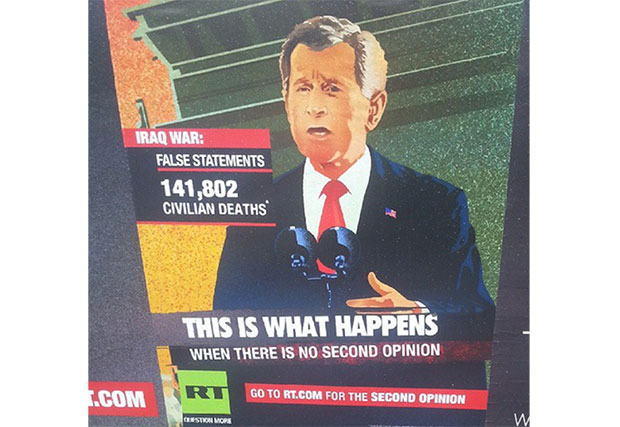
(Photo: Padraig Reidy)
There’s a poster near my house in London. It shows a poorly illustrated George W. Bush, aboard the USS Abraham Lincoln early in the Iraq war, with the now infamous “Mission Accomplished” banner behind him. To his side, the tally of dead in the Iraq War (at least according to Iraq Body Count). Underneath is emblazoned the slogan: “This is what happens when there is no second opinion.” It is an advert for Russian propaganda channel RT (formerly Russia Today).
It’s a slightly muddled poster, but the signal is clear: did you feel lied to about the Iraq war? Watch RT.
Curiously, RT, which launched a UK channel on 30 October, seems to believe the poster doesn’t exist. A “report” on the RT website, dated 9 October, claims that the campaign of which this poster is part was “rejected for outdoor displays in London because of their ‘political overtones’”. The story goes on to claim that the “rejected” posters were replaced by ones that simply say “redacted”, before urging readers to download an RT app to view the ads on their phones.
But I have seen the poster. I even took a picture. Yet RT insists it has been banned, saying that outdoor advertising companies cited the Communications Act 2003, which “prohibits political advertising”. This prohibition is indeed to be found in the act, but only applies to broadcast advertisements, not billboard advertisements for broadcasters.
This is a fairly crude illustration of RT’s attitude to the truth. It is simply not an issue. What’s important is something that might sound true, something just about plausible, to suit the agenda (in this case, the agenda is threefold: one, to get people to download the app; two, to sow the belief that “they” are scared of RT; and three, to introduce the notion that political advertising is subject to a blanket ban in the UK).
Fair enough, you might say. But have you seen Fox News? Don’t all sorts of news organisations bend the truth to fit their agenda? There’s a case to be made, but there’s also a crucial difference. RT is funded and controlled by the Kremlin and is on a mission; a mission outlined in a new report by The Interpreter, part of the Institute of Modern Russia (disclosure: Index on Censorship has on occassion crossposted content from The Interpreter).
“The Menace of Unreality: How the Kremlin Weaponizes Information, Culture and Money” elucidates what we had already long suspected: the Soviet Union may be dead, but Soviet tactics remain. And while the west may not want to believe it is in conflict with Russia, the Russians are already acting like it is (witness reports of heightened Russian air force activity in and near Nato airspace).
The report’s authors, Michael Weiss and Peter Pomerantsev, describe disinformation techniques dating back to the Soviet era: straight propaganda, certainly, but also Dezinformatsiya — the planting of false stories to undermine confidence in western governments. These include alleged coup plots, the bizarre theory that AIDS was created by the CIA, even the suggestion that the assassination of Kennedy was an inside job.
The suggestion is that democracy is a sham, and that democratic governments are at best hypocrites and at worst constantly, deliberately acting against the interests of their own populations.
The best false stories always have a ring of truth and a ring of empathy. Many politicians are hypocrites, some politicians act against the interests of those they should represent. If this much is true, is it that much of a leap to imagine that the entire system is a crock? That democracy and human rights are empty terms? We’re just asking legitimate questions, as every conspiracy theorist ever has said at some point.
Conspiracy theorists find a home at RT. Presenter Abby Martin, for example, who briefly won praise for apparently criticising Russia’s actions in Ukraine, says she still has “many questions” (just asking questions!) about the September 2001 attacks on the World Trade Center, and has used her show to expound on “false flag” attacks, alleged Israeli eugenics, and every US conspiracy theorists’ favourite, the massacre in Waco, Texas of David Koresh’s Branch Davidian cult in 1993.
All this would mean nothing if RT didn’t have a willing audience in the UK, the US and beyond. But a combination of a large budget, photogenic presenters and a certain way with a YouTube clip makes RT a serious player. It never quite veers into the straight out lunacy of Iran’s Press TV, which is quite open about its conspiracist contributors, and it looks like a serious operation. Furthermore, its positioning as an “alternative news source”, albeit one controlled by an increasingly authoritarian, paranoid and erratic Russian state, finds it fans among people who would rail against their own liberal states and societies (on the two occasions I visited the Occupy St Paul’s encampment in London, Russia Today was playing on a large screen there). All the while, the autocratic Putin is strengthened as democracy in undermined worldwide (witness how easily Putin was able to put the kibosh on effective intervention against Syria’s Assad through the relentless repetition of the line that helping the opposition would mean helping jihadist terrorists).
So what, as Lenin himself once asked, is to be done? After reports of UK broadcast regulator Ofcom’s recent investigations into RT for bias earlier this week, some people saw a chance to get RT taken off the air just weeks after it had begun. But this impulse is too close to political censorship in principle, and in practice, an ineffective sanction against a force that has huge power online, with millions upon millions of YouTube hits.
Decent democrats that they are, Weiss and Pomerantsev suggest eternal vigilance is required: we must be able to combat RT’s half truths and insinuations effectively, with hard facts and hard arguments, in order to stop them spreading. As ever, when arguments for counterspeech as the best defence against poison is suggested, one remembers Yeats’s lines: “The best lack all conviction, while the worst/Are full of passionate intensity.”
But this time 25 years ago, as East and West Germans embraced on top of the Berlin Wall, the world showed that the right argument can win even against the very worst. The Kremlin is playing the same games now as it did in its darkest days. Democrats should be ready to fight back.
This article was posted on 13 November 2014 at indexoncensorship.org





